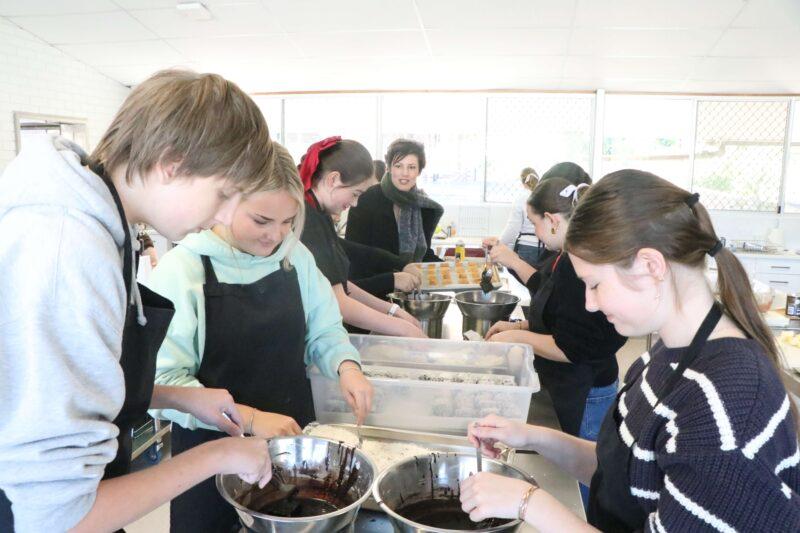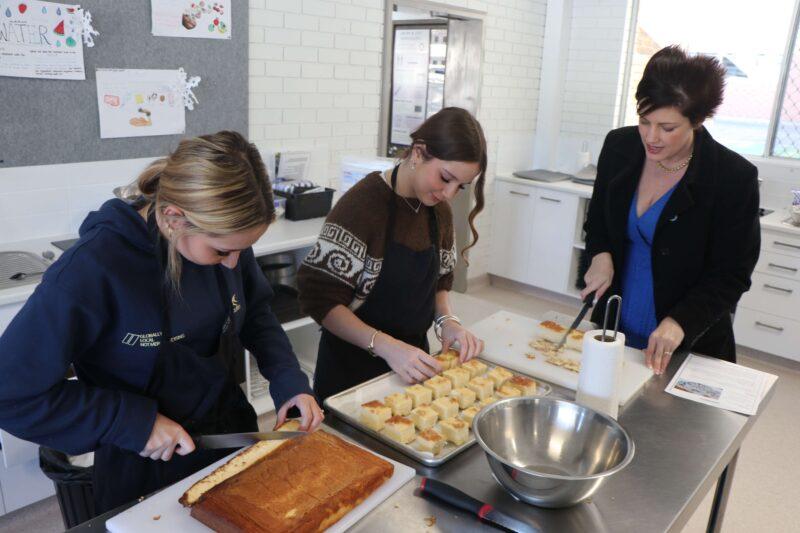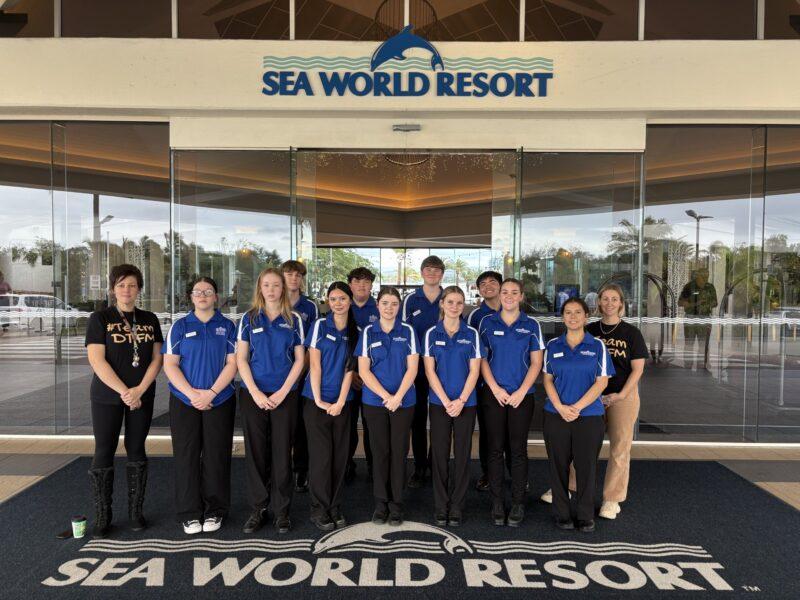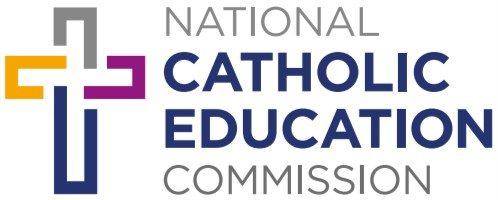Belinda Vlasenko is an experienced and passionate educator currently serving as the Curriculum Leader for Design Technologies: Food and Materials (DTFM), Hospitality & Tourism, and Culture at Trinity College Beenleigh. With a teaching career spanning nearly two decades, Belinda has taught a diverse range of subjects including VET Hospitality and Tourism, English, History, and Support for students with learning difficulties across various year levels. In her leadership role since 2023, she draws on a deep commitment to student agency, inclusive learning, and faith-informed education. Her teaching is shaped by a belief in the power of connection, creativity, and service—values that underpin her most impactful projects and define her approach within a Catholic, Marist educational context.



What inspired you to become a teacher?
Right from the beginning, for me, school was a place of wonder and enjoyment. I loved to learn and was lucky enough to encounter many, many teachers whose passion and dedication to sharing their subject was contagious. I enjoyed my classes and learning academically but it was the extracurricular opportunities (which really opened up in high school) that drew me to the profession. I loved the idea that you could spend your life sharing your passion with young people and encouraging them to find their own. I loved the idea that, within that vocation or that calling, there was so much latitude to bring other aspects of joy and experience to students through musicals, showcases and functions, community engagement and support programs, Youth Parliament, debating, sports, arts and culture. Also, I was acutely aware that while I felt connected to and grateful for this institution, there were many who did not. The challenge of working with these students and finding ways to engage them, to provide them with positive, authentic success experiences and to awaken in them some of the joy I felt for learning and being at school was really what inspired me to become a high school teacher.
Can you share a moment in your career where you really felt you made a difference?
In early 2021, my Year 10DTFM (Design Technologies: Food and Materials) class were discussing their post-covid feelings of disconnection and discontent. They reported feeling unsettled by a world whose rules and norms were constantly changing, lost in the chaos that Covid had created and powerless to change it. “A bit like Alice must have felt when she slipped down the rabbit hole,” a student said, in passing. This rather throw-away comment led to a new discussion between the parallels of how Alice must have felt in Alice in Wonderland and how they were feeling, today: powerless, lost, disconcerted and disconnected within the ever-shifting confines of a ‘new world’ that she/they fell into without warning.
Instead of giving in to the shifting sands of the new realities she faced, Alice threw herself – sometimes head-on – into the world around her. Alice was brave and curious, even though she was scared: she was tenacious and took some risks and I suggested that it was time for us to collaborate and do the same. We knew that we couldn’t control covid but perhaps we could control some of our reactions to it. Perhaps, like Alice, we could embrace this new normal and strive to make connections, improve our own characters and well-being by doing for others, serving as citizens in our own school community and focusing our energies not on worry and anxiety about the constant state of change but on building something, together. Something tangible, something wonderful, something we could control and create: a journey into Wonderland. The vision became that of a fully immersive world where, just for a short time, we could transport out Junior School peers to a place of wonder and connection: a place they would help to create.
The first part of my students’ assessment focused on them designing age-appropriate design tasks for their peers from Prep to Year 6. Each student would then see something they designed, embedded in the world: thus making them co-creators and therefore co-owners of our Wonderland. Quickly our excitement and engagement spread. What started as a class project evolved into an interdepartmental, cross-campus alliance. Out ITD expert showed me how to use the laser cutter so we could design, cut and paint over 100 MDF figurines to populate Wonderland. Out Aviation team learned how to fly their drones inside the hall to capture a bird’s eye view of the installation. Arts and Media got on board sourcing costumes and capturing the moments of joy for the students, on the day.
In the end, the installation was so large it took up the entire hall and it took us two whole days to get 700 students (including the kids from the local kindies) down the rabbit hole and through Wonderland. We had to navigate lock downs, postponements, social distancing and all the other changes to education. But what hadn’t changed was that we all wanted to feel connected, empowered and purposeful: all students, all teachers, all human beings. As a teacher, I wanted to draw from the curriculum and my students’ agency to activate powerful, student-centred, real-world learning: learning that fostered the Global Competencies, learning that created memorable and effective educational experiences based on authentically agentic tasks, co-created and co-owned by the students. Agentic learning transforms students from passive recipients to active participants in the learning process. My students wanted to feel like they were in control of their learning and their world, to serve their Junior School peers and create a world that gave them a short break from the anxiety-riddled one Covid had created, by doing something challenging, creative and purposeful. I wanted to help them feel joy, curiosity, empowerment, challenge, exasperation and – most importantly – commitment: commitment to, in and from their learning, each other and their school community. Our journey down the rabbit hole did all this and more. The sense of empowerment and achievement through agency at a time where they felt helpless was truly a moment in my career where I felt blessed to be able to really make a difference.
Is there a story from your time teaching that has in inspired you/had a deep impact on you?
Working with the students to build the 2024 Trinity College Beenleigh Cultural Showcase was one of the most inspiring things I’ve done, in my career.
Students had been advocating to host a Cultural Showcase for four years and had finally succeeding in having it included in the school calendar, Term 1, the year I took over as Cultural Leader. I didn’t know them and they didn’t know me. It had been 20 years since the last Cultural Showcase at the school. We had been given seven weeks to create a school-wide Cultural Showcase.
It seemed impossible to many that a show with no set parameters, no budget and no pre-set vision could be respectfully and successfully envisioned, designed, created and assembled – by the students, for the students – in such a culturally diverse school, so quickly. But the students’ passion, dedication, vision and drive surpassed even my high expectations. They spear-headed everything – from writing to the BSM for a budget to sourcing and ordering costumes and videographers. They were involved in and drove every aspect of the production of this real-world event. More than 10 cultures were represented in the showcase with many more carrying their national flag on the catwalk, to open the show. It was such a hugely uplifting and joyous event that the students advocated to host a second Showcase, later in the year, so that they could share their Culture with their families and the wider community.
It is difficult to adequately describe the depth of the connections that I witnessed the students forge, over the course of the project. They made deep connections with students within their cultural group across different grades, the older students having a chance to take on leadership and guidance roles within each group. They made connections amongst students from other cultures as they worked together to advocate for and market the event. Their attendance and engagement at the College grew exponentially as a result of the ownership of this student agency driven, extracurricular event. Similarly, connections were strengthened between students’ families and the school during the encore Showcase, later in the year. Watching these young people develop into strong, proud and successful leaders within their school community was one of the most impactful things I’ve been a part of in my 20-year teaching career. The fortitude, commitment, resilience and respect they displayed for this project, their selves and one another was both inspiring and uplifting.
How does your faith shape your teaching approach?
Teaching at Trinity College Beenleigh, a Marist school, I aim to integrate faith and Catholic values into my curriculum and pedagogy, emphasising the importance of service, compassion and ethical behaviour. Educators in Marist schools look to Mary as their example, seeking to nurture, teach, gather, reconcile and stand with young people. I am deeply committed to these goals and they are the foundations of my teaching approach. Saint Marcellin’s way of educating was personal, rooted in real life and practical. He had a love of work, was a sworn enemy of laziness and advocated for simplicity, family spirit and presence. In the Marist way, I aim to co-create high quality, collaborative, real-life educational experiences, through which learning outcomes for all students reflect awareness of individual gifts, interests, aspirations and achievements. I passionately believe in developing the Culture of Service within our school community, encouraging students to think of how they can serve others with kindness and respect, reflecting the Catholic tradition of service to the community.
What’s the most rewarding part of teaching in a Catholic school?
The most rewarding part of teaching in a Catholic school is the opportunity to make a meaningful impact on students’ lives, both academically and spiritually. I get to witness students grow not just in their hospitality or academic skills but also in their personal and spiritual development. It’s incredibly fulfilling to see students apply the values of compassion, integrity and service in their work and daily lives. Additionally, the supportive and close-knit community at Trinity College Beenleigh makes teaching here a truly enriching experience. The support I’ve received from Craig Hirst (a Deputy Principal and my mentor at Trinity College Beenleigh) and from Kristina Carr (my co-teacher in DTFM and my nominator for the Australian Educator Awards) cannot be overstated. I have grown as a person and as a professional thanks to their unwavering support, encouragement and guidance.
What do you think is the most valuable role Catholic education plays in today’s society?
Catholic education plays a crucial role in today’s society by fostering holistic development and promoting values that contribute to the common good. It prepares students to be not only competent professionals but also ethical and compassionate individuals. In the context of preparing today’s young people to lead the world tomorrow, this means preparing students to excel in their field(s) while also being mindful of their impact on others and the community. Catholic education instills a strong moral foundation, encouraging students to make positive contributions to society and to act with integrity and empathy in all their endeavours. Most importantly, we aim to help students find the serenity to accept the things they cannot change, the courage to change what they can and the wisdom to know the difference: to find peace, love and purpose, in an ever-changing world.
